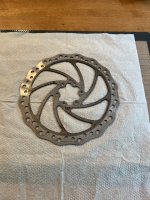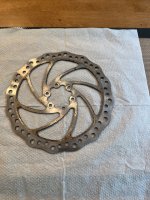Not long ago, I checked my rear brake because it sounded scratchy. I saw a fine wire sticking out of the caliper. It was something I'd never encountered: 2 inches of 0.6mm saw wire, used in tiny coping saws to cut materials like glass. I don't know how it got on the street or how I picked it up.
One pad was worn to the metal on one corner, but the four edges of the opposing pad were even, with little wear after 2500 miles. I guess the saw wire cut away one corner, and the piston tipped the backing plate to that corner.
In the past, I'd bought two sets of resin pads. This time I ordered Corki semi-metalic. I had a pair of Corki resin pads from years ago. I put them in the rear and replaced the front ones, which didn't look worn, with semi-metalic Corkis.
To mount or adjust a caliper, I snug the screws, then back off just enough to let the caliper slide under each screw, maybe a quarter turn. Then I lash the brake lever to the handlebar, using a shoelace with a clove hitch or a velcro strap with a buckle. Clamping the disc tightly will align the caliper with the disc. Now, if I were to torque one screw while the other allowed easy movement, maybe torquing could cause the caliper to twist by flexing the disc. So, although it may be only 1/4 turn, I go back and forth so that one screw will help hold the caliper in place as I tighten the other. I've always ended up without drag or sponginess. I've never worried about o-rings.
The rigidity of ISO hex keys lets me feel when a socket screw is properly tight. (My ball-end keys are handy and equally rigid.) R clips are easier to work with than cotter pins.
When wet, the semi-metalic pads howl. I've never applied brakes faster than 25 mph and never needed brakes to control a long, steep descent. Resin pads have served me well for 5 years. I'll switch the front brake back to resin. My new $6 spreader is a few hundredths of a mm thicker than my disks, so I can set the gap before sliding the caliper into place.
View attachment 197920View attachment 197921 keys, R
View attachment 197919


